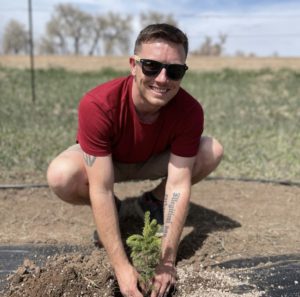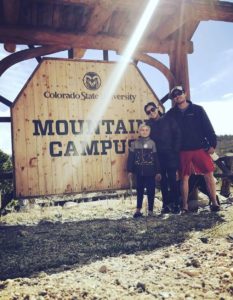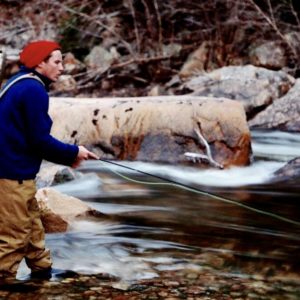
Nate Kettle is not your conventional college student.
Immediately after high school, Kettle enlisted in the military and worked as both a joint forward observer and a psychological operations analyst. He served for four years in active duty and in the reserves for another four.
Throughout his military service, Kettle encountered a variety of endangered species and natural areas at different training sites. This sparked his interest in his major, fish, wildlife and conservation biology, a degree he will be graduating with on May 14 from the Warner College of Natural Resources.
Growing up in Fort Collins, Kettle always knew he wanted to go to Colorado State University. With his service background, he was immediately drawn to CSU’s Center for Environmental Management of Military Lands, which allowed him to visualize a future career path after graduation.
In addition to being a veteran and student, Kettle is also a father to his 11-year-old son and a husband to his wife of 11 years. Raising a family while being a student is a unique experience, and Kettle said he appreciates the opportunity to set an example for his son.

“It’s cool that I get to graduate college, and he’ll be 11 years old. He’ll remember that pretty vividly,” Kettle said.
Outside of life as a student, Kettle enjoys backcountry snowboarding, fly fishing and working on his family’s lavender farm.
His family started the lavender farm five years ago, and there they grow 10-15 different varieties of lavender. Kettle often invites other Warner College students to the farm to learn about lavender farming and bee keeping. His whole family is involved in the farm, and Kettle noted his father’s love of working with Warner College students who come to the farm. Overall, Kettle said he values the opportunity to go outdoors and be with his family.
When reflecting on his time at WCNR, Kettle noted the influence of key role models on his experience. He said he appreciates the help of Ann Randall, an assistant professor and his academic advisor in the FWCB department.
“Ann has been a huge role model for me, and she has helped me put myself out there and gain the confidence I needed,” Kettle said.
Randall said Kettle’s diverse experience lends to his commitment to improving the field of conservation.
“I valued his well-rounded approach in the sense that he looked at complex conservation issues with a wealth of diverse experiences and an honest commitment to making the world a better place,” Randall said. “I am confident that his respectful approach and commitment to learning will allow him to be a successful agent for change.”
In his own words
Q: What are your plans after graduating?
A: I plan to work full-time for the CEMML. They are currently working on a climate change project that informs the Air Force’s integrated natural resources plans, and I work on both of those projects right now.

Q: What is your dream job?
A: My dream job would be to work in Guam on invasive species. I would mostly want to work on feral pigs and brown tree snakes. Now that I work in natural resources, I can see that Guam is ground zero for many issues, and I want to be a part of the solution for some of the problems they face there.
Q: What has been your favorite memory at Warner College?
A: My favorite memory was skiing Mummy Pass during the first week of course NR 220. I skied it a second time later that week with another recent graduate, Ethan Zellar, and we were able to really get out there and adventure.
Q: What will you miss most about CSU?
A: I will miss the adventure in academia where you get to explore new things to your liking. It’s like a buffet of knowledge.
Q: Do you have any advice for incoming freshmen?
A: Put yourself out there and start meeting people. Engaging with faculty members is a great way to start making those connections.